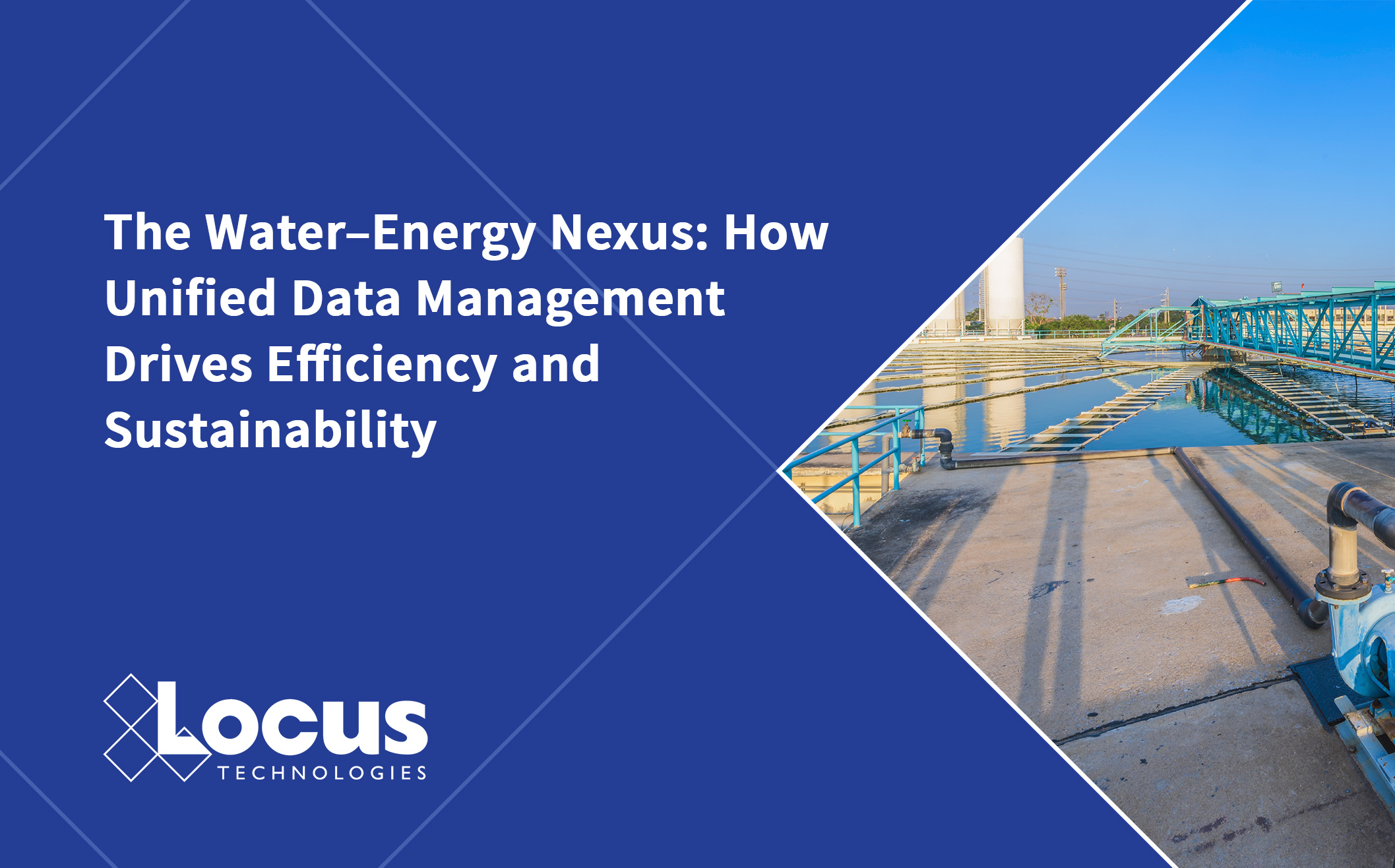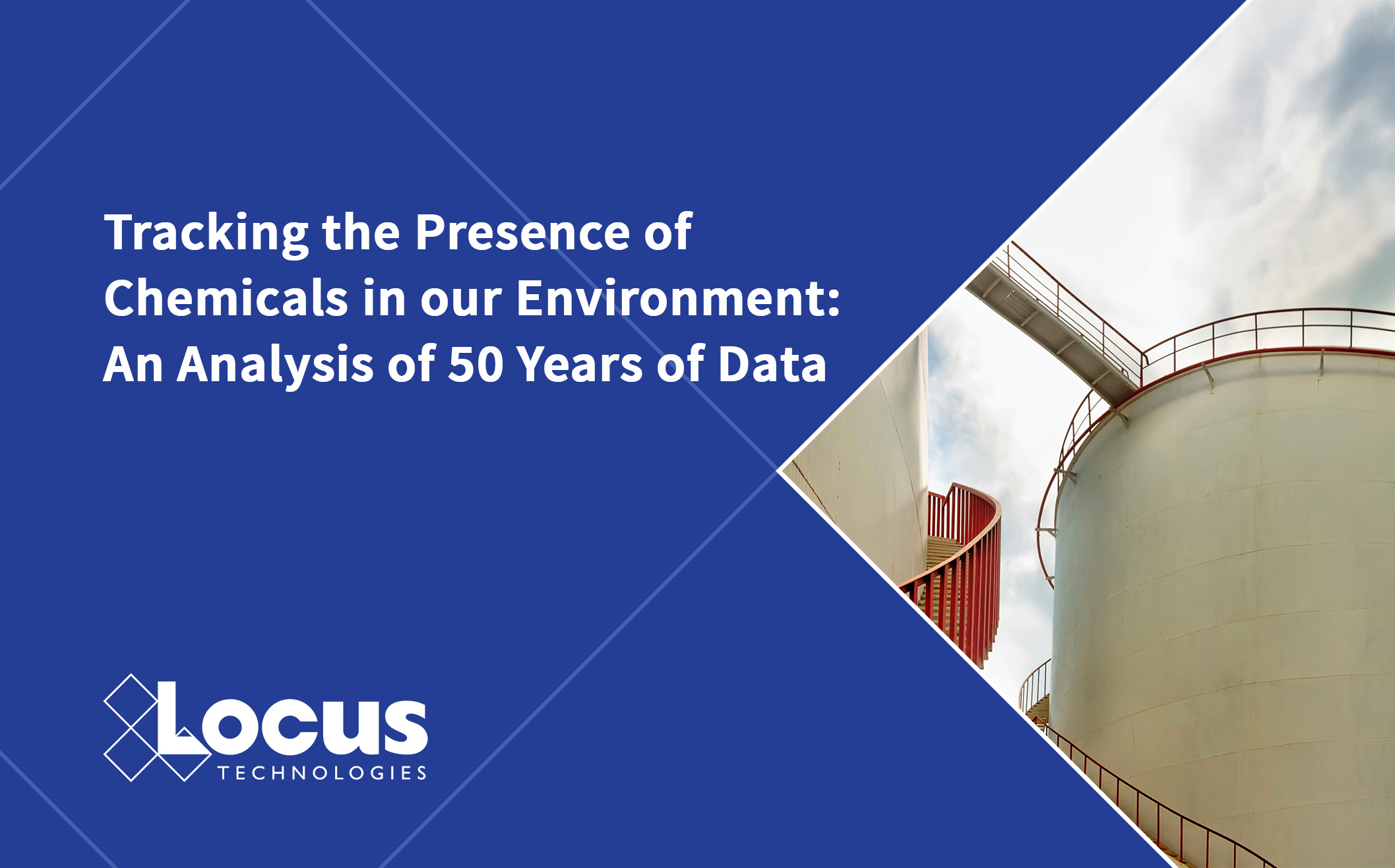The Water–Energy Nexus: How Unified Data Management Drives Efficiency and Sustainability
By Neno Duplan

Understanding the Water–Energy Nexus
The water–energy nexus refers to the interconnected relationship between energy production and water use, and it is a defining challenge of modern sustainability. Managing both resources together has become essential for achieving operational efficiency, carbon reduction, and regulatory compliance.
Earlier research by Locus Technologies explores how AI demand and data centers intensify the need for efficient resource use. But beyond the tech sector, the same unified approach is revolutionizing how energy companies, utilities, and manufacturers manage environmental performance.
Across industries, AI-native EHS and ESG software now enables organizations to analyze energy and water data together — maximizing savings, strengthening compliance, and reducing environmental impact.
Case Study: Reducing Water Footprint in Oil and Gas Operations
A Fortune 50 oil and gas company uses Locus environmental data management software (Locus Platform) to monitor freshwater withdrawals of about 53.1 thousand megaliters of freshwater annually – that’s the equivalent of 21,240 Olympic-size swimming pools of water [53.1 thousand megaliters = 53,100 × 1,000 = 53,100,000 m³= 14,029,537,200 gallons].
By linking water metrics to refinery energy data, the company pinpointed inefficiencies where water use was disproportionate to output. Insights from Locus Platform led to:
- Enhanced water recycling measures
- Lowered water withdrawal
- Reduced energy needed for pumping and treatment
- Smaller water footprint, lowered energy and compliance costs.
The project shows how AI-driven EHS software turns sustainability insights into measurable ROI, demonstrating that compliance efficiency can directly enhance profitability.
Case Study: Empowering Water Utilities with Integrated Energy Management
Municipal and regional water utilities use Locus Platform to balance pumping efficiency, distribution energy costs, and water conservation goals.
Through IoT sensors across distribution networks and treatment facilities, real-time analytics, and machine learning, utilities have achieved:
- Double-digit reductions in energy consumption for water distribution
- Optimized pump scheduling and leakage control
- More reliable water delivery with lower grid demand
One water utility discovered a pressure imbalance causing unnecessary over-pumping. Locus’s unified data platform identified the anomaly, allowing the team to trim their water losses and cut power use by an estimated 15% in that sector of the network. More broadly, these types of improvements not only save money for the utilities (and by extension, for ratepayers) but they also reduce the strain on the electrical grid.
Given the World Bank’s projected 56% water supply gap by mid-century, digital solutions like Locus enable utilities to optimize resources, delay costly capacity expansions, and reduce their carbon footprint.
Case Study: Streamlining Compliance and Efficiency in Nuclear Power Plants
In the nuclear energy sector, precision and compliance are non-negotiable. A major nuclear utility replaced manual, spreadsheet-based reporting with Locus Environmental Information Management (EIM) software and its Radiation Control Module.
Results included:
- Compiling critical annual reports went from a month-long laborious process to an automated task done in minutes
- The automation improved accuracy and allowed the engineers to focus on proactive water management around the plant.
- The customer can now more closely watch cooling water usage trends and thermal discharges in real time, confident that any compliance deviations will trigger immediate alerts.
By correlating water data, power output, and weather conditions, the utility optimized cooling tower operations to use less water on cooler days (when air cooling can carry more load) and strategically scheduled maintenance during low-demand periods.
These examples illustrate how AI-enabled environmental compliance systems have helped the plant maintain output to feed data center-heavy regions without increasing its water withdrawals – a win for both the grid and the local watershed.
Why the Water–Energy Nexus Is Central to Modern EHS Strategy
These use cases confirm that integrating water and energy data is essential for companies pursuing net-zero goals, ESG reporting, and regulatory resilience.
Modern AI-native EHS platforms like Locus Platform deliver:
- Unified data for water, air, and energy emissions
- Automated EPA, NRC, and DOE compliance reporting
- Embedded real-time monitoring and alerts with robust IoT connectivity
- Scalable cloud-based architecture for enterprise sustainability management.
By closing the loop between data collection, analysis, action, and reporting, organizations can transform compliance from a reactive burden into a strategic advantage.
The Path Forward for Sustainable Operations
The water–energy nexus embodies the future of sustainable industrial management. With Locus Technologies’ AI-powered environmental software, organizations can:
- Reduce resource waste
- Strengthen regulatory compliance
- Lower carbon and water footprints
- Empower data-driven ESG performance
As industries face increasing environmental scrutiny and operational complexity, companies that embrace unified, AI-powered EHS platforms will lead the next era of sustainable, efficient, and transparent operations.
Neno Duplan
Founder & CEO
As Founder and CEO of Locus Technologies, Dr. Duplan spent his career combining his understanding of environmental science with a vision of how to gather, aggregate, organize, and analyze environmental data to help organizations better manage and report their environmental and sustainability footprints. During the 1980’s, while conducting research as a graduate student at Carnegie Mellon, Dr. Duplan developed the first prototype system for an environmental information management database. This discovery eventually lead to the formation of Locus Technologies in 1997.
As technology evolved and new guidelines for environmental stewardship expanded, so has the vision Dr. Duplan has held for Locus. With the company’s deployment of the world’s first commercial Software-as-Service (SaaS) product for environmental information management in 1999 to the Locus Mobile solution in 2014, today Dr. Duplan continues to lead and challenge his team to be the leading provider of cloud-based EH&S and sustainability software.
Dr. Duplan holds a Ph.D. in Civil Engineering from the University of Zagreb, Croatia, an M.S. in Civil Engineering from Carnegie-Mellon, and a B.S. in Civil Engineering from the University of Split, Croatia. He also attended advanced Management Training at Stanford University.
Locus is the only self-funded water, air, soil, biological, energy, and waste EHS software company that is still owned and managed by its founder. The brightest minds in environmental science, embodied carbon, CO2 emissions, refrigerants, and PFAS hang their hats at Locus, and they’ve helped us to become a market leader in EHS software. Every client-facing employee at Locus has an advanced degree in science or professional EHS experience, and they incubate new ideas every day – such as how machine learning, AI, blockchain, and the Internet of Things will up the ante for EHS software, ESG, and sustainability.




